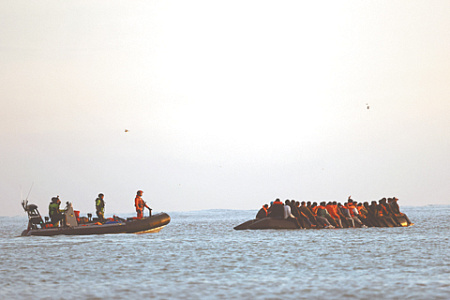
The British government is launching a new strategy to combat the unprecedented number of illegal migrant crossings in the English Channel, focusing its efforts not on the migrants themselves, but on the international criminal networks that facilitate them. Starting July 23, a new sanctions regime will target companies, corrupt officials, and smugglers profiting from the dangerous journeys that have brought a record 20,000 people to UK shores so far this year.
Spearheaded by Prime Minister Keir Starmer’s administration, the initiative, developed by Foreign Secretary David Lammy and Home Secretary Yvette Cooper, aims to dismantle the smugglers’ business model. The sanctions will target firms supplying boats and equipment, forgers of fake travel documents, and the kingpins who orchestrate the crossings from afar. This marks a significant shift from previous policies that primarily focused on border patrols and processing asylum seekers after their arrival.
Recognizing the cross-border nature of the issue, the UK has also initiated a joint pilot project with France, the primary departure point for the small boats. Under a new “one-in, one-out” agreement, the UK will return a number of migrants who attempted the illegal crossing to France, while in exchange accepting the same number of legitimate asylum seekers directly from French camps. The government hopes this will sever the incentive for migrants to risk the perilous sea journey.
However, the new measures have been met with significant skepticism. Critics, including members of the opposition Conservative Party, argue that the sanctions are unlikely to be effective. “You will not stop the Channel crossings by freezing a few bank accounts in Baghdad or imposing a travel ban on a dinghy salesman in Damascus,” stated Conservative MP Chris Philp, who dismissed the plan as a sign of weakness that smugglers, who he says laugh at UK laws, will easily circumvent.
The government’s decisive action is driven by immense domestic pressure. Public discontent over the daily arrival of boats is growing, a sentiment reflected in opinion polls and recent events. A protest erupted in London on July 20 outside a hotel housing asylum seekers, sparked by the arrest of a migrant on suspicion of sexual assault. The incident underscores the rising social tensions that the government is under pressure to resolve.
Experts highlight a fundamental challenge that these new sanctions fail to address: the UK’s legal isolation from Europe post-Brexit. Without participation in the EU’s Dublin Regulation, which determines which country is responsible for processing an asylum claim, the UK has no standing agreement to return migrants to the European Union. This forces London to negotiate bilateral deals, like the pilot with France, on a case-by-case basis.
While the UK is also pursuing cooperation with countries like Germany to target smugglers operating from their territory, analysts describe the overall strategy as a collection of “piecemeal” solutions. Until a comprehensive returns agreement with the EU is reached—a prospect Brussels is currently unwilling to discuss—the British government may find itself tackling the symptoms of the Channel crossings crisis, rather than its root cause, leaving the long-term effectiveness of its new war on smugglers in serious doubt.
